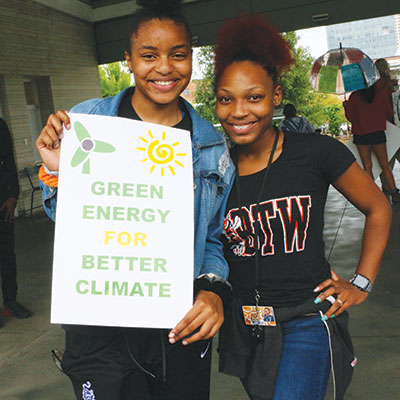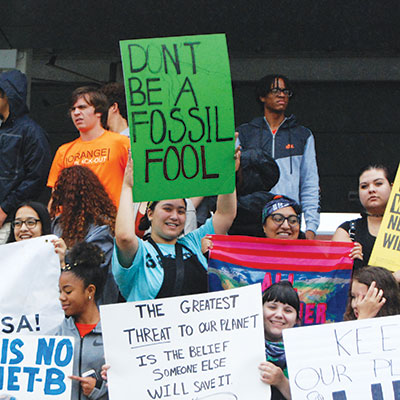For the kids
Youth global climate strike comes to Tulsa
Hundreds of young people turned out for the Global Climate Strike at Guthrie Green on Sept. 20.
Kyra Bruce
“Change is coming—whether you like it or not.”
That was 16-year-old Greta Thunberg’s message to world leaders at the United Nations Climate Action Summit in New York on Sept. 23. The Swedish activist—who sailed across the Atlantic Ocean on a two-week voyage to deliver her urgent plea—inspired global climate strikes on Sept. 20, led mostly by young people, with more than 4 million participants worldwide.
In Tulsa, hundreds gathered in the drizzle at Guthrie Green in conjunction with the strike. Youth easily outnumbered adults 2:1. Gathered beneath the pavilion on the north end of the park, advocates took turns speaking, delivering an urgent unified message: Combating climate change is a battle for survival, and young people will bear the brunt of its impact.
“It just seems like it’s just progressively getting worse ... the government doesn’t seem like they’re wanting to listen to us right now,” said Booker T. Washington High School freshman Alex. “I hope in the future they listen to the protest and actual science.”
 Many striking students shared this hope. Fellow BTW student Mikah had climate data pulled up on her phone, ready to share “facts on facts on facts” with whoever needed to hear. “Personally I think [lawmakers] should speak more about the facts … sooner or later we’re all just going to die out if they don’t change,” she said.
Many striking students shared this hope. Fellow BTW student Mikah had climate data pulled up on her phone, ready to share “facts on facts on facts” with whoever needed to hear. “Personally I think [lawmakers] should speak more about the facts … sooner or later we’re all just going to die out if they don’t change,” she said.
Tulsa School of Arts and Sciences student Gavin agreed that politicians are not doing enough to address the crisis, taking special aim at those actively working against progress.
“I went to DC recently and met with our Sen. Jim Inhofe and he has a whole book called Global Warming: America’s Biggest Hoax,” Gavin said. “He’s just so socially disconnected and doesn’t talk to anyone and just stays in his dim-lit office and has been there the past 50 years doing nothing.”
Kids are concerned about the planet they’ll inherit, but also about the planet they are leaving to future generations. “I have a little brother, and what’s going to happen when he gets older?” a student named Shatayia said. “Is he going to be able to do the stuff that I used to do when I was little?”
.jpg) Judy, who heads the Booker T. Washington environmental club with fellow student Leah, said the climate crisis forces her to balance future life plans with the prospect of environmental catastrophe. “It’s upsetting because you think like if I want to have kids or whatever, particularly you think about the world they’re going to live in … How’s [climate change] going to affect that?”
Judy, who heads the Booker T. Washington environmental club with fellow student Leah, said the climate crisis forces her to balance future life plans with the prospect of environmental catastrophe. “It’s upsetting because you think like if I want to have kids or whatever, particularly you think about the world they’re going to live in … How’s [climate change] going to affect that?”
Leah said it’s the government’s job “to set regulations for big companies of how much they can pollute.” But despite the fact that 100 companies are responsible for 71 percent of the world’s carbon emissions, Judy pointed out that individual choices, like cutting back on waste, can make a difference.
“[Using] reusable water bottles, for sure,” she said. “I quit using makeup wipes. I’m trying to go on to other systems of makeup removal. It’s just small things that you don’t think about.”
 Tulsa Public Schools excused absences for the students who participated in the strike. “As educators, we have made the commitment to help prepare our young people to be active and engaged members of our democracy,” TPS communications director Emma Garrett-Nelson wrote in an email to The Tulsa Voice. “We would hope that Tulsa Public Schools students feel empowered to advocate for their beliefs and values. While we cannot lead or otherwise encourage students to strike, we honor their First Amendment rights to protest in a peaceful manner about an issue that is so important to our community.”
Tulsa Public Schools excused absences for the students who participated in the strike. “As educators, we have made the commitment to help prepare our young people to be active and engaged members of our democracy,” TPS communications director Emma Garrett-Nelson wrote in an email to The Tulsa Voice. “We would hope that Tulsa Public Schools students feel empowered to advocate for their beliefs and values. While we cannot lead or otherwise encourage students to strike, we honor their First Amendment rights to protest in a peaceful manner about an issue that is so important to our community.”
After taking turns speaking, the crowd turned to the sidewalks, marching the square block surrounding Guthrie Green. Climate change is not a lie! Do not let our planet die! they chanted. While the young people striking for climate action made no bones about the severity of the crisis, currents of perseverance coursed throughout. For students like Leah, actions like this are an opportunity to harness the power of collective action. “We’re just trying to get people involved and excited about what we can do.”
* * *
To see the full gallery from the climate strike click here.
* * *
Greta Thunberg’s remarks at the U.N. Climate Action Summit
Sept. 23, 2019 / New York City
This is all wrong. I shouldn’t be up here. I should be back in school on the other side of the ocean. Yet you all come to us young people for hope. How dare you!
You have stolen my dreams and my childhood with your empty words. And yet I’m one of the lucky ones. People are suffering. People are dying. Entire ecosystems are collapsing. We are in the beginning of a mass extinction, and all you can talk about is money and fairy tales of eternal economic growth. How dare you!
For more than 30 years, the science has been crystal clear. How dare you continue to look away and come here saying that you’re doing enough, when the politics and solutions needed are still nowhere in sight.
You say you hear us and that you understand the urgency. But no matter how sad and angry I am, I do not want to believe that. Because if you really understood the situation and still kept on failing to act, then you would be evil. And that I refuse to believe.
The popular idea of cutting our emissions in half in 10 years only gives us a 50 percent chance of staying below 1.5 degrees [Celsius], and the risk of setting off irreversible chain reactions beyond human control.
Fifty percent may be acceptable to you. But those numbers do not include tipping points, most feedback loops, additional warming hidden by toxic air pollution or the aspects of equity and climate justice. They also rely on my generation sucking hundreds of billions of tons of your CO2 out of the air with technologies that barely exist.
So a 50 percent risk is simply not acceptable to us — we who have to live with the consequences.
To have a 67 percent chance of staying below a 1.5 degrees global temperature rise—the best odds given by the [Intergovernmental Panel on Climate Change]—the world had 420 gigatons of CO2 left to emit back on January 1st, 2018. Today that figure is already down to less than 350 gigatons.
How dare you pretend that this can be solved with just ‘business as usual’ and some technical solutions. With today’s emissions levels, that remaining CO2 budget will be entirely gone within less than 8 1/2 years.
There will not be any solutions or plans presented in line with these figures here today, because these numbers are too uncomfortable. And you are still not mature enough to tell it like it is.
You are failing us. But the young people are starting to understand your betrayal. The eyes of all future generations are upon you. And if you choose to fail us, I say: We will never forgive you.
We will not let you get away with this. Right here, right now is where we draw the line. The world is waking up. And change is coming, whether you like it or not.
Thank you.


.jpg)
.jpg)
